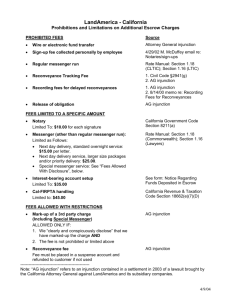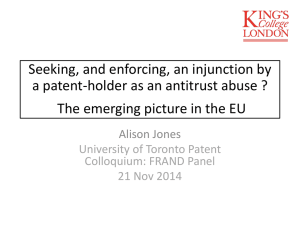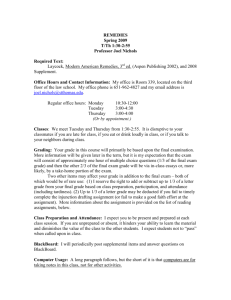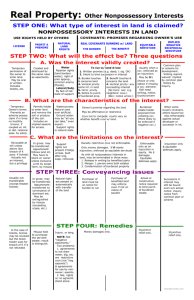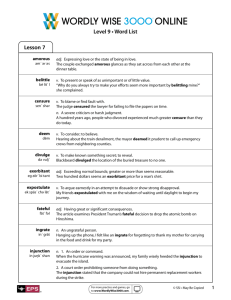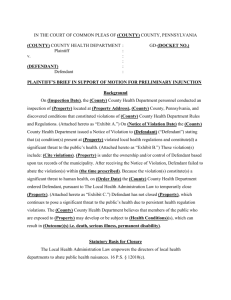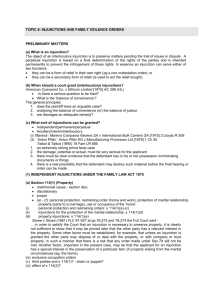Question Q219
advertisement
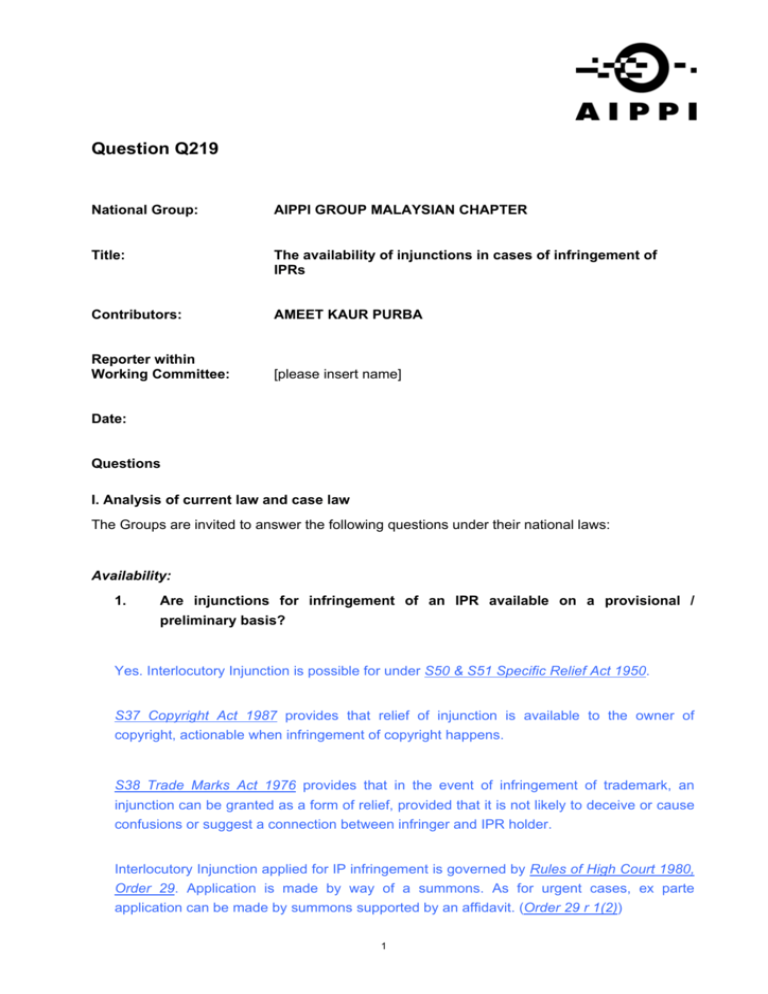
Question Q219 National Group: AIPPI GROUP MALAYSIAN CHAPTER Title: The availability of injunctions in cases of infringement of IPRs Contributors: AMEET KAUR PURBA Reporter within Working Committee: [please insert name] Date: Questions I. Analysis of current law and case law The Groups are invited to answer the following questions under their national laws: Availability: 1. Are injunctions for infringement of an IPR available on a provisional / preliminary basis? Yes. Interlocutory Injunction is possible for under S50 & S51 Specific Relief Act 1950. S37 Copyright Act 1987 provides that relief of injunction is available to the owner of copyright, actionable when infringement of copyright happens. S38 Trade Marks Act 1976 provides that in the event of infringement of trademark, an injunction can be granted as a form of relief, provided that it is not likely to deceive or cause confusions or suggest a connection between infringer and IPR holder. Interlocutory Injunction applied for IP infringement is governed by Rules of High Court 1980, Order 29. Application is made by way of a summons. As for urgent cases, ex parte application can be made by summons supported by an affidavit. (Order 29 r 1(2)) 1 Interim injunctions are intended to “preserve the right of IPR holder pending suit” 2. Are injunctions for infringement of an IPR available on a permanent basis? Yes. Perpetual Injunction / Final Injunction is available for cases of Copyright, at the option of the owner of copyright. Assignee or exclusive licensee can only apply for final injunction if it is joined by the owner of copyright. S38(3) Copyright Act 1987. S51(2) Specific Relief Act 1950: a perpetual injunction can only be granted by a decree made at ahearing and upon the merits of the suit. S52(3) Specific Relief Act 1950 also has illustration as to when patent (illustration ‘r’), copyright (illustration ‘s’) and trademark (illustration ‘t’) have been infringed, perpetual injunction can be granted. S53 Specific Relief Act 1950: court has a discretion in granting a mandatory injunction to prevent infringement / compel performance of certain acts. Illustration (g) states that the court may issue a mandatory injunction and order copies of pirated products to be given up or destroyed. Criteria: 3. If yes to question 1, what are the criteria for the grant of an injunction on a provisional/preliminary basis? The plaintiff must establish 3 things: (decided by UK House of Lords in American Cyanamid Co v Ethicon Ltd [1975] All ER 504, principles of which have been followed by the Malaysian case of Keet Gerald Francis Noel John v Mohd Noor bin Abdullah & Ors [1995] 1 MLJ 193) (i) there is a serious question to be tried (Keet Gerald Francis Noel John v Mohd Noor bin Abdullah & Ors [1995] 1 MLJ 193) (ii) Remedy of damages may not be adequate to the injury suffered / Injury are irreparable. (Television Broadcasts & Ors v Seremban Video Centre Sdn Bhd [1985] 1 MLJ 171) (iii) On the balance of convenience, the injunction ought to be granted. (Keet Gerald Francis Noel John v Mohd Noor bin Abdullah & Ors [1995] 1 MLJ 193) (Associated Tractors Sdn Bhd v Chan Boon Heng & Anor [1990] 2 MLJ 408) (Series 5 Software Ltd v Phillip Clarke & Ors [1996] FSR 273) Note: balance 2 of convenience can shift over time! (EE & Brian Smith Ltd v Hodson [2007] EWCA Civ 1210) (UK case) The test is still currently in force, as shown to be applied by the Kuching High Court in Ops Suria (EM) Sdn Bhd v Ayuda Enginerring Services Enterprise Sdn Bhd [2011] MLJU 202. The test was also mentioned in the court of appeal (RHB Bank v L&R Holding Sdn Bhd & Anor [2011] 3 MLJ 162) and federal court (Tan See Siong & Anor v Herman Ando [2011] 3 MLJ 429), to which the court did not reject the application of the test in their respective trial. 4. If yes to question 2, what are the criteria for the grant of an injunction on a permanent basis? A: Assignee or exclusive licensee can only apply for a final injunction if it is joined by the owner of copyright. S38(3) Copyright Act 1987. Also, the right of the applicant must already have been established (i.e the trial is finished), as such injunction is intended to ’’finally settle the rights of a party“ 5. If not addressed in answering questions 3 and 4, does the criteria for the grant of an injunction differ depending on whether the injunction sought is on a provisional/preliminary or permanent basis? If so, how? Yes, it differs. For an interlocutory injunction, the court must assess the following when deciding whether to grant the interlocutory injunction: (Gopal Sri Ram JCA in Court of Appeal in Keet Gerald Francis Noel John v Mohd Noor bin Abdullah & Ors [1995] 1 MLJ 193) (i) judge will ask himself whether there is a bona fide serious issue to be tried, and must refrain from determining the merit of the case (as this is to be done in the full trial). (ii) Judge will consider which side does the justice lie, taking into account relevant matters such as practical realities. He must also weight the balance of convenience between both parties. (iii) Judge must at all time remember that his grant (if he chose to) is always discretionary, and is intended to maintain the status quo for the limited time only between time of grant and time of trial. He must state the matter he took into consideration while coming to this decision. 3 A perpetual injunction can only be granted by the decree made at the hearing and upon the merits of the suit - (S51(2) Specific Relief Act 1950) 6. Are the criteria for the grant of an injunction equally applicable to infringement of all IPRs? Yes. They are all refering to the per curiam decision of Gopal Sri Ram JCA in Court of Appeal in Keet Gerald Francis Noel John v Mohd Noor bin Abdullah & Ors [1995] 1 MLJ 193, which follows the case of American Cyanamid Co v Ethicon Ltd [1975] All ER 504. Also, they are all given under discretion of the court. 7. If no to 6, are there any specific criteria or considerations for the grant of an injunctions for particular IPRs? If so, what criteria apply and to which IPRs? - Not Applicable – 8. Are there any specific criteria or considerations for particular subject matter, for example, pharmaceutical patents? If so, what criteria or considerations apply to what subject matter? No. There are only regulations as to the names of pharmaceutical products which cannot be too similar to other substances to avoid confusion. 9. Are there any specific considerations relevant to particular IP holders, for example, NPEs? If so, what considerations are relevant and to what IPR holders? Perpetual Injunction / Final Injunction is available for cases of Copyright, at the option of the owner of copyright. Assignee or exclusive licensee can only apply for a final injunction if it is joined by the owner of copyright. S38(3) Copyright Act 1987. However, assignee or exclusive licensee are not restricted to such condition for the application of an Interim Injunction. Discretion: 10. Is there any element of judicial discretion in relation to the grant of an injunction for infringement of IPRs? If so, how does the discretion apply? 4 Yes. Although there are criterias governing the different types of injunction for infringement of IPRs, all forms of injunctions are given under court’s discretion. (S50 Specific Relief Act 1950) Since an injunction is an equitable remedy, equity maxims applies. If the court finds that any of the maxims are not followed, they have the discretion to deny the grant of injunction. (see below: Q12) 11. Are there any circumstances in which a court must grant an injunction for infringement of an IPR? If so, in what circumstances? If the applicant satisfies the criteria mentioned in Q3, then the court “should” grant an Injunction. However, whether the applicant has satisfied the criteria is decided at the discretion of the court. 12. Are there any circumstances where infringement of an IPR is proved and no permanent injunction is available? If so, in what circumstances? (i) When damages are an adequate remedy to the injury suffered by the applicants, then injunction will not be available. (Intel Corporation v Intelcard Systems Sdn Bhd& Others [2004] 1 MLJ 595) (Television Broadcasts & Ors v Seremban Video Centre Sdn Bhd [1985] 1 MLJ 171) (ii) An Injunction will not be granted if it will prevent the completion of a partly built building, or requires a partly built/completed building to be demolished. S37(3) Copyright Act 1987. (iii) An Injunction will not be granted if there was no patent registered at the first place (illustration ‘b’) or the IPR owner himself made a false representation in his own product. (illustration ‘c’ of S54 Specific Relief Act 1950) (iv) Equitable maxims not fulfilled. For example: i. Delay defeats equity. (Evercrisp Snack Products (M) Sdn Bhd & Anor v Sweeties Food Industries Sdn Bhd [1980] 2 MLJ 297) However, the plaintiff is not deemed to know every each company who infringes its trademark at the time of their incorporation. The starting “count of time” is from the moment the plaintiff realises that the defendant has infringed their trademark. (Intel Corporation v Intelcard Systems Sdn Bhd& Others [2004] 1 MLJ 595) ii. Equity comes with clean hand. (illustration ‘c’ of S54 Specific Relief Act 1950) 5 Scope: 13. Is an injunction granted only against named parties to the infringement proceeding, or is an injunction available more broadly against potential infringers such as customers or manufacturers who are not parties to the proceeding? The injunction granted will usually bind only those who are named in the decree of injunction. However, Order 45 Rule 9 of the Rules of the High Court 1980 provides that if the injunction is enforced onto a 3rd party who is not a party to the proceeding, he will be bound as if he is a party of the proceeding. Also, those who aid or abet a party (where an injunction applied to them) to disregard the injunction granted will be guilty of contempt of court. (TO Thomas v Asia Fishing Industry [1977] 1 MLJ 151, affirmed by the KL High Court in MediaCorp News Pte Ltd & Ors v MediaBanc & Ors [2010] MLJU 436) There is also case law to support that a person who is not a party to a disputed contract but are party to the lawsuit (of which injunction is sought) can be bound by the injunction. In Keet Gerald Francis Noel John v Mohd Noor bin Abdullah & Ors [1995] 1 MLJ 193, the court held that the plaintiff can sue the second and third defendant, albeit are not party to the original contract, as there are evidence suggesting that they are the “string puppets” of the first defendant, who is the party to the original contract. The court subsequently issued an injunction against the second and third defendant. 14. Is there a specific form of words used by your courts to describe the scope of the grant of an injunction? If so, what is the 'formula'? There are no specific form of words used to describe the scope of grant of an injunction. However, the term used in an injunction order must be specific to the extent the parties is clear as to what they can do, cannot do or must do. Morris v Redland Bricks. Ltd [1970] AC 652, followed by KL High Court in Apparatech (M) Sdn Bhd v Ng Hock Chong & Anor [2006] 2 MLJ 61; and Kuching High Court in Jawi Ak Landu v Sunny Inspiration Sdn Bhd and Anor [2006] MLJU 613. 15. Is the grant of an injunction referable to the item(s) alleged to infringe the relevant IPR, or may the grant of an injunction be broader in scope? If it may be broader, what is the permissible scope of the injunction? 6 Usually the injunction granted will not be more than what is prayed for in the summons, as the judge will usually just grant or dismiss the application of injunction based on the written summons submitted by the parties. However, there have been situations where if the injunction is too oppressive or worded too broadly, the court may “alter” the injunction order to a more appropriate extent. (Voon Keng v Syarikat Muzwina Development Sdn Bhd [1990] 3 MLJ 61). Hence, it can be arguably said that the court may grant an injunction to be broader in scope (at the discretion of the court) to include other IPR as well, to the extent the court deems fit. Judicial trends and practice: 16. Is there any discernible trend in your country as to the willingness or otherwise of courts to grant or refuse injunctions for particular IPRs or in relation to particular subject matter? Since injunctions are granted at the discretion of the courts, they are free to grant or refuse injunction, provided that they had come to the conclusion after considering the following: (i) the applicant fulfilled the criterias as in Q3 / Q4; and (ii) the applicant does not fall under the provisions of S54 Specific Relief Act 1950 “Refusal of an Injunction” The above discretion exercised by the court is applied across all kind of IPR and IPR holder. An injunction granted will also feature a “notice” informing the person on whom the court order is served the consequences of disobeying the injunction. Order 45, Rule 7(4) Rules of the High Court 1980; Allport Alfred James v Wong Soon Lan [1989] 1 MLJ 338 (Singapore case applying its Rules of Court identical to our Rules of the High Court 1980). 17. What, if any, has been the impact of the eBay v Merc-Exchange decision or any tendency of the courts in your jurisdiction to treat final injunctions as discretionary? Please explain whether the eBay v Merc-Exchange decision has been relied on or cited by your courts, and in what circumstances. Alternatively, or in addition, has there been any legal commentary on any potential implications of the eBay v Merc-Exchange decision in your jurisdiction? 7 In eBay v Merc-Exchange the US supreme court case established that: (i) the court will not automatically grant permanent injunctive relief when there is a patent infringement; (ii) the court will not automatically deny the grant of injunctive relief when there is no activity exercising the IP right by the IPR holder. (iii) The real test is to adhere to the “long established equity principle” where: a. The plaintiff suffered irreparable injury b. Remedy at law is inadequate c. Balance of Hardships considered and grant of injunction is warranted d. Public interest would not be disserve by granting injunction Thus far there are no Malaysian case law / journal mentioning eBay v Merc-Exchange. Further the likelihood of the aforesaid case having any impact to the principles applied for in Malaysia is unlikely as in Malaysia, the granting of injunctions are ALWAYS discretionary thus is similar to the principles accorded by the case of eBay v MercExchange. Availability of provisional/preliminary injunctions: 18. Should there be a test or criteria for the grant of a provisional/preliminary injunction for the infringement of an IPR? If yes, what should that test or those criteria be? Yes. 19. If no, what principles should be considered in determining whether to grant an provisional/preliminary injunction? N/A Availability of permanent injunctions: 20. Should there be a test for the grant of a permanent injunction for the infringement of an IPR? If yes, what should that test be? Yes. The current common law principles that are being applied appear to be satisfactory. 21. If no, what principles should be considered in determining whether to grant a permanent injunction? N/A Discretion: 8 22. In what circumstances, if any, should the grant of an injunction automatically follow a finding of infringement of an IPR? The circumstances in which an injunction will be granted will depend on whether the relevant tests have been met. 23. In what circumstances, if any, should the grant of an injunction be denied notwithstanding a finding of infringement of an IPR? In the event the necessary tests are not met. Differences between IPRs: 24. Should the above test/principles apply equally to all IPRs? Yes. 25. If no, what should any differences be and why? N/A Scope: 26. Should an injunction be granted only against named parties to infringement proceeding, or should an injunction be available more broadly against potential infringers such as customers or manufacturers who are not parties to the proceeding? Injunctive relief should only be granted against named individuals, who are parties to the action. Only in very exceptional cases should an injunction be granted against a party and or parties who are not named provided that they are identified with sufficient precision and duly notified of the injunction against them. 27. What is the appropriate scope of an injunction prohibiting an infringer from committing further infringing acts? For example, should the injunction relate simply to the IP the subject of the allegation of infringement, or should the injunction be broader in scope? If broader, what is the permissible or desirable scope? Injunctive relief should be limited to the subject of the allegation of the infringement. Note: It will be helpful and appreciated if the Groups follow the order of the questions in their Reports and use the questions and numbers for each answer. If possible type your answers in a different colour. Thank you for your assistance. 9
